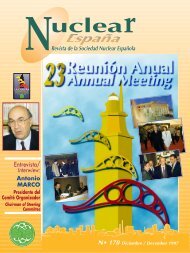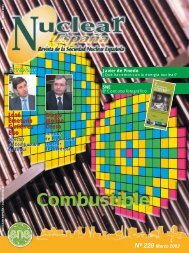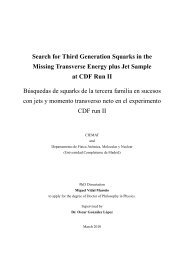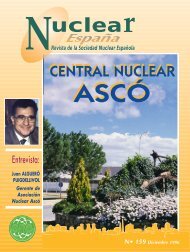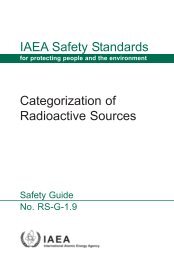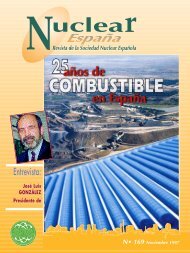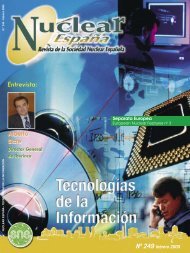EntrEntr evista/evista/ InterInter viewview
EntrEntr evista/evista/ InterInter viewview
EntrEntr evista/evista/ InterInter viewview
Create successful ePaper yourself
Turn your PDF publications into a flip-book with our unique Google optimized e-Paper software.
Hay unas 100 unidades nucleares<br />
en los EE.UU., que representan casi<br />
el 30% del suministro eléctrico del<br />
país. Hasta hace poco, el sector estaba<br />
muy fragmentado, con más de<br />
80 empresas explotadoras participando<br />
en la energía nuclear, número<br />
demasiado grande para un mercado<br />
competitivo donde ya no se<br />
pueden trasladar los costes a los<br />
consumidores y donde la escala es<br />
crítica para la eficiencia.<br />
La NRC, el organismo regulador<br />
nuclear de EE.UU., apoya la consolidación.<br />
A lo largo de los próximos<br />
cinco años, quiere que se reduzca<br />
el número de los grandes explotaheaded<br />
for extinction. Those days are over, with<br />
production costs dropping and regulations for fossil<br />
fuel burning plants rising, there’s a renaissance<br />
taking place in nuclear power that would have been<br />
unthinkable five years ago.<br />
And from the same article my favourite piece:<br />
Nukes looked like dead meat for a while, but<br />
aren’t a few companies seen likely to end up<br />
running most of the nukes because that’s emerged<br />
as the most efficient way to do it.<br />
What are the main causes of this renaissance:<br />
There used to be something “special”about<br />
nuclear power: the men in white coats, the cost pass<br />
through culture, “don’t worry, trust us”. All of that<br />
has been blown away-whether its in the UK where<br />
the majority of the formerly government assets have<br />
been sold off and now must compete in the open<br />
market or whether its in the United States where deregulation<br />
is in the process of eliminating the cost<br />
pass through culture.<br />
Nuclear is just another means of generating<br />
electricity, there is nothing special about it and if it<br />
cannot compete against gas-fired generation it will<br />
be shut down.<br />
Thankfully nuclear is getting its act together and<br />
overall performance world-wide continues to<br />
improve.<br />
Finally I have witnessed first hand a renewed<br />
confidence within the industry. Once the initial<br />
shock of being exposed to the real world passes,<br />
employees react positively to the new challenge.<br />
They start to have pride in working for a business<br />
that is competitive and can stand on its own two<br />
feet.<br />
Turning now to British Energy, in the UK we own<br />
and operate 15 reactors with a total capacity of<br />
9.600 MW. We produce 21 % of the UK’s electricity.<br />
Safety is our number one priority. For example,<br />
over the last 6 years our dose rate to both employees<br />
and contractors has steadily declined.<br />
Over the last 5 years our AGR output has<br />
increased substantially, in terms of performance<br />
improvements and a unit operating costs that have<br />
been reduced from 2.37 pence to 2.0 pence which<br />
is 15 % reduction in outturn money values and 25<br />
% reduction in real money values with a<br />
productivity measured by GWh per employee has<br />
risen by 60 %.<br />
Finally, operating profit has gone up from ò156<br />
million to ò476 million for the most recent financial<br />
year.<br />
And remember, all of that economic improvement<br />
has been achieved with a constantly improving<br />
safety culture. Safety performance and commercial<br />
performance go hand in hand. A management<br />
which cares a staff which is involved.<br />
Turning now to the United States, a few words<br />
about what’s happening in the market.<br />
The most dramatic change is the introduction of<br />
competition through the widespread deregulation of<br />
the electricity US market. Already 22 states have<br />
deregulated with others following soon.<br />
Deregulation is forcing US electricity companies<br />
to decide what their strategy going forward should<br />
be.<br />
Quite a number of companies have decided to<br />
focus on being generators, others have sold off their<br />
generation to concentrate on transmission and<br />
distribution. Others again have decided to remain as<br />
traditional vertically integrated businesses.<br />
For many this has meant getting bigger through<br />
mergers and acquisitions. Last year alone around 15<br />
major mergers were announced including for the<br />
first time the foreign acquisition of US utilities.<br />
que hace cinco años hubiera sido<br />
impensable.<br />
Y a continuación cito mi parte favorita<br />
del artículo:<br />
Durante un tiempo parecía que<br />
las centrales nucleares estaban más<br />
que muertas, pero ahora parece<br />
probable que unas cuantas compañías<br />
acaben explotando la mayoría<br />
de ellas, ya que ha resultado ser el<br />
método más eficiente.<br />
¿Cuáles son las razones principales<br />
de este renacimiento?<br />
Antes la energía nuclear tenía algo<br />
“especial”: los hombres en batas<br />
blancas, la cultura de traslado de<br />
costes, “no se preocupen, confíen<br />
en nosotros”. Todo ello se ha desvanecido,<br />
tanto en el R.U. donde la<br />
mayor parte de los anteriores activos<br />
del gobierno se han vendido<br />
por la necesidad de competir ahora<br />
en un mercado abierto, como en<br />
los Estados Unidos donde la liberalización<br />
está eliminando la cultura<br />
de traslado de costes.<br />
La energía nuclear solo es otro<br />
medio de generación de electricidad;<br />
no tiene nada de especial y, si<br />
no puede competir con la generación<br />
por gas, desaparecerá.<br />
Afortunadamente, la energía nuclear<br />
está poniendo su casa en orden<br />
y sigue mejorando el rendimiento<br />
global a nivel mundial.<br />
Por último, he presenciado de<br />
cerca una confianza reavivada dentro<br />
de la industria. Una vez superado<br />
el shock inicial de estar expuestos<br />
al mundo real, los empleados<br />
reaccionan de forma positiva al<br />
nuevo reto. Empiezan a sentirse orgullosos<br />
de trabajar en un negocio<br />
que es competitivo y que puede<br />
mantenerse en pie por sí solo.<br />
En cuanto a British Energy, en el<br />
R.U. poseemos y explotamos 15 reactores<br />
con una capacidad total de<br />
9.600 MW, produciendo el 21% de<br />
la electricidad del país.<br />
La seguridad es nuestra primera<br />
prioridad. Por ejemplo, durante los<br />
últimos 6 años, ha ido disminuyendo<br />
paulatinamente la tasa de dosis<br />
en nuestras centrales tanto para los<br />
empleados como para los contratistas.<br />
Durante los últimos 5 años, nuestra<br />
producción AGR ha aumentado<br />
sustancialmente en lo que se refiere<br />
a mejoras de rendimiento, y los<br />
costes de operación por unidad se<br />
han reducido desde los 2,37 peniques<br />
a 2,0 peniques, que es una reducción<br />
del 15% en el valor monetario<br />
de la producción y del 25%<br />
en el valor monetario real. La productividad<br />
medida en base a GWh<br />
por empleado ha subido un 60%.<br />
Finalmente, los beneficios de explotación<br />
han subido de ê156 millones<br />
a ê476 millones en el ejercicio<br />
fiscal más reciente.<br />
Cabe destacar que todas estas<br />
mejoras económicas se han logrado<br />
con una mejora continua de la cultura<br />
de seguridad. La seguridad y el<br />
rendimiento comercial van unidos,<br />
con una dirección que se preocupa<br />
y una plantilla involucrada.<br />
Con referencia ahora a los<br />
Estados Unidos, diré unas palabras<br />
sobre lo que está pasando en el<br />
mercado.<br />
El cambio más dramático se ha<br />
producido con la introducción de<br />
la competencia mediante una amplia<br />
liberalización del mercado de<br />
electricidad estadounidense.<br />
Veintidos estados han liberalizado<br />
ya el mercado, y otros lo harán<br />
pronto.<br />
La liberalización está obligando a<br />
las empresas eléctricas estadounidenses<br />
a decidir la estrategia que<br />
van a seguir de ahora en adelante.<br />
Un número importante de compañías<br />
han decidido dedicarse a la<br />
generación, mientras que otras han<br />
vendido su capacidad generadora<br />
para centrarse en el transporte y la<br />
distribución, y otras han decidido<br />
mantener la integración vertical de<br />
sus negocios tradicionales.<br />
Para muchas empresas, esto ha<br />
supuesto el crecimiento mediante<br />
las fusiones y adquisiciones. Solo<br />
durante el último año, se anunciaron<br />
15 fusiones importantes, incluyendo<br />
por primera vez la adquisición<br />
extranjera de empresas<br />
estadounidenses.<br />
¿Qué significa todo esto para la<br />
industria nuclear estadounidense?<br />
A b r i l 2 0 0 0<br />
R e v i s t a S N E





